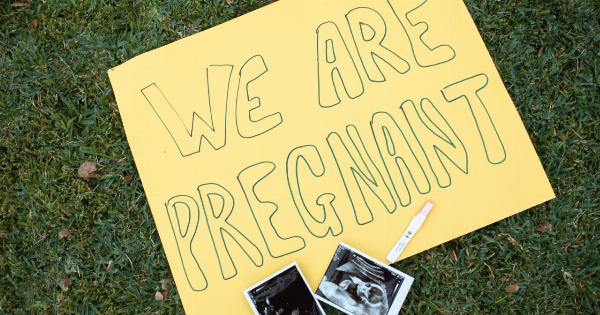Discovering that you are pregnant is one of the most exciting and life-changing moments a woman can experience. While some pregnancies may be planned and eagerly anticipated, others may come as a surprise.
Regardless of the circumstances, it is important to be aware of early signs of pregnancy so that you can take appropriate action and ensure the best possible outcome for both you and your baby.
1. Missed Period
A missed period is often the first and most prominent sign of pregnancy. If your menstrual cycle is usually regular and you have missed your period, it may be a strong indication that you are pregnant.
However, it is important to note that a missed period can also be caused by other factors, such as stress, hormonal imbalances, or certain medical conditions. Therefore, it is advisable to take a pregnancy test to confirm your suspicions.
2. Breast Changes
During early pregnancy, your breasts may undergo noticeable changes in size, shape, and sensitivity. They may become tender, swollen, or feel fuller than usual.
You may also notice darkening of the areolas (the area surrounding the nipples) and the appearance of blue veins on your breasts. These changes occur due to increased blood flow and hormonal fluctuations in preparation for breastfeeding.
3. Fatigue
Feeling excessively tired or fatigued is another common early sign of pregnancy. The body goes through numerous changes during pregnancy, including an increase in hormone production and changes in blood pressure and metabolism.
These changes can leave you feeling exhausted, especially during the first trimester. If you find yourself needing more rest than usual or feeling constantly drained, it may be a sign that you are pregnant.
4. Nausea and Morning Sickness
Nausea, commonly referred to as morning sickness, is a classic early sign of pregnancy. Although it is called morning sickness, it can occur at any time of the day or night.
You may experience feelings of queasiness, vomiting, or aversions to certain smells and foods. Morning sickness is believed to be caused by the hormonal changes that occur during pregnancy, but the exact cause is still not fully understood.
5. Frequent Urination
If you find yourself making more frequent trips to the bathroom to urinate, it could be a sign of early pregnancy. Increased blood flow to the pelvic area and hormonal changes can lead to more urine production.
Additionally, as the uterus grows, it exerts pressure on the bladder, causing the need to empty it more often. Frequent urination is especially common during the first and third trimesters of pregnancy.
6. Changes in Appetite and Food Cravings
Pregnancy can bring about significant changes in appetite and food preferences. You may find yourself experiencing unusual cravings or aversions to certain foods.
This is believed to be caused by hormonal fluctuations, particularly an increase in estrogen levels. Additionally, the body may require more calories and nutrients to support the growing baby, leading to changes in appetite.
7. Mood Swings
Pregnancy hormones can have a profound impact on your emotional well-being. Many women experience mood swings during early pregnancy, ranging from elation to irritability.
These fluctuations in mood are normal and can be attributed to the changes taking place in your body. However, if you find that your emotions are significantly impacting your daily life, it is important to seek support from loved ones or a healthcare professional.
8. Heightened Sense of Smell
Another early sign of pregnancy is an increased sensitivity to smells. Many pregnant women report a heightened sense of smell, often accompanied by aversions to certain odors.
This is thought to be related to the hormonal changes that occur during pregnancy. It is important to note that individual experiences may vary, and not all women will have this symptom.
In conclusion, being aware of the early signs of pregnancy can help you take early action and ensure the best possible care for yourself and your baby.
If you suspect that you may be pregnant, it is advisable to take a home pregnancy test or consult with a healthcare professional for confirmation and guidance.





























